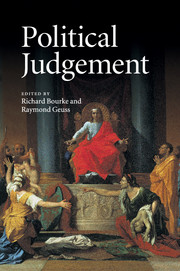Book contents
- Frontmatter
- Contents
- List of contributors
- Acknowledgements
- Introduction
- Part I The character of political judgement
- Part II Trust, judgement and consent
- Part III Rationality and judgement
- 7 Pericles' unreason
- 8 Accounting for human actions: individual agency and political judgement in Montaigne's Essais
- 9 Nehru's judgement
- Part IV Democracy and modern political judgement
- Bibliography of the works of John Dunn
- Index
8 - Accounting for human actions: individual agency and political judgement in Montaigne's Essais
from Part III - Rationality and judgement
Published online by Cambridge University Press: 26 December 2009
- Frontmatter
- Contents
- List of contributors
- Acknowledgements
- Introduction
- Part I The character of political judgement
- Part II Trust, judgement and consent
- Part III Rationality and judgement
- 7 Pericles' unreason
- 8 Accounting for human actions: individual agency and political judgement in Montaigne's Essais
- 9 Nehru's judgement
- Part IV Democracy and modern political judgement
- Bibliography of the works of John Dunn
- Index
Summary
An understanding of politics as it bears on human interests cannot hope to be a unified vision from a single point of view. For one thing, it must seek to do justice to the full heterogeneity of human points of view … it must also try to register the implications for what the interests of human beings really are of the bewildering variety of human imaginings across cultures, across space, across time and across the lifetime of every individual.
The view that human sentiments and human behaviour are characterised by their varied and ever-changing nature is one of the best known features of Montaigne's work. From the pages of the Essais the human self emerges as infinitely diversified, as well as engaged in a process of constant transformation: on the stage of a world inhabited by a variegated palette of tribes and cultures, each human being is still unique, while personal identities – including the writer's own – are reshaped through time by particular, and ultimately incomparable, individual experiences. This belief in the instability of the human condition formed an essential part of Montaigne's sceptical approach: from the somewhat conventional discussion of classical historiographical topics in the earlier sections of the text, to the bolder analysis of contemporary political circumstances in Book III, the ‘inconstancy’ of human nature contributed to undermine any attempt to explain individual and collective action through fixed patterns and stable rules.
This suspension of judgement over the general principles supposedly ruling human agency was not merely a philosophical posture, a clever but essentially speculative attitude.
- Type
- Chapter
- Information
- Political JudgementEssays for John Dunn, pp. 229 - 253Publisher: Cambridge University PressPrint publication year: 2009



